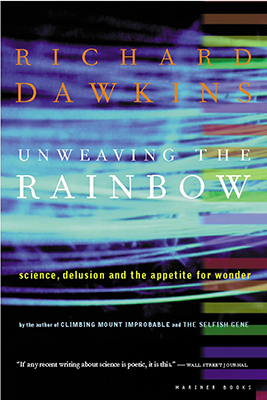Unweaving The Rainbow
“Unweaving the Rainbow: Science, Delusion and the Appetite for Wonder” is a book written by Richard Dawkins, published in 1998. In this book, Dawkins explores the relationship between science, art, and the human experience, challenging the notion that a scientific understanding of the world diminishes its beauty or wonder.
The title of the book is taken from a line in John Keats’ poem “Lamia,” where Keats laments that Isaac Newton’s scientific explanations of rainbows have “unweaved the rainbow” and taken away its magic. Dawkins seeks to counter this idea by arguing that a scientific understanding of natural phenomena enhances, rather than diminishes, our appreciation of the world’s beauty.
Throughout “Unweaving the Rainbow,” Dawkins explores a wide range of scientific topics, from the origins of life and the universe to the intricacies of genetics and evolutionary biology. He uses vivid language and compelling examples to illustrate the elegance and complexity of natural processes, showing how scientific explanations enhance our sense of wonder rather than detract from it.
Dawkins also addresses common misconceptions and objections to science, such as the idea that it destroys mystery or robs the world of meaning. He argues that science is a powerful tool for uncovering the mysteries of the universe and deepening our understanding of the world’s complexity and diversity.
In addition to discussing the beauty of nature, Dawkins explores the role of science in shaping human culture and society. He argues that a scientific worldview promotes critical thinking, curiosity, and intellectual honesty, fostering a deeper appreciation for the wonders of the natural world.
Overall, “Unweaving the Rainbow” is a celebration of science and its capacity to inspire awe, wonder, and fascination. Dawkins’ eloquent prose and passionate defense of scientific inquiry make this book a compelling read for anyone interested in exploring the mysteries of the universe and the power of human curiosity.

